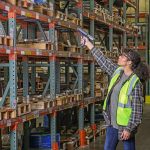Industry Talk
Regular Industry Development Updates, Opinions and Talking Points relating to Manufacturing, the Supply Chain and Logistics.Driving the North’s digital growth

While London’s digital startups multiply, Yorkshire and the Humber languishes near the bottom of techUK’s Local Digital Index, which measures the strength of the local tech ecosystem. The decline of the UK’s heavy industry during the 1980s continues to cause economic challenges in towns and cities that relied on the coal, steel and manufacturing sectors. Home to around 23 million people, these once-industrial areas are concentrated largely across the North and the Midlands in England, as well as Scotland and Wales.
Employment rates, hourly earnings and life expectancies below the national average have made these communities the target of a recent UK Government regeneration policy aiming to address longstanding regional inequalities.
The UK’s flourishing digital economy could offer a much-needed boost for these former industrial centres. As only the third in the world to reach a trillion-dollar valuation, our nationwide tech sector employs over two million people, or six per cent of the UK’s workforce.
Yet, a deeper look into the industry shows a digitally divided nation. According to consulting firm RSM, quarter one of 2024 saw over 7,000 tech company incorporations in London and 1,350 in the South East, compared with just 479 in Yorkshire and the Humber.
So, what can we do to ensure a thriving tech ecosystem in the North’s former industrial communities?
Closing the digital divide
Encouraging digital growth in the North requires a multifaceted approach that considers the regional tech sector’s strengths and areas for improvement. Since 2020, techUK’s Local Digital Index has tracked the progress in each region across the UK for digital skills, adoption, infrastructure, R&D, investment, trade and the overall technology ecosystem.
In the 2023 index, Yorkshire and the Humber ranked tenth out of the UK’s twelve regions, scoring highly for digital infrastructure, but poorly with regards to skills, investment, R&D and trade.
The ranking was published alongside recommendations on how businesses and local governments could foster digital growth, which included updating available skills and training schemes, and providing business support to startups.
This approach has already seen success in the North West, with Manchester doubling its level of tech investment between 2021 and 2022, raising £532 million of funding and becoming the biggest tech hub outside of London and the South East.
Affordability matters
While the index is useful for tracking broad regional progress, it fails to account for the importance of broadband affordability in creating a sustainable digital economy. Take for example Hull in East Yorkshire, a port city that suffered an economic downturn as its fishing and shipbuilding industries declined. Although East Yorkshire and Northern Lincolnshire ranks highly for broadband infrastructure, it sat in 35th place overall out of the index’s 41 cities and counties, due to poor skills and trade.
Although Hull’s infrastructure has long supported full fibre connectivity, the city historically endured some of the UK’s highest broadband prices. The dominance of an incumbent network operator in the area resulted in a lack of choice and affordability for Hull and its wider community. Without cost-effective access to broadband, it proves difficult for people to grow confident using the internet and develop their digital skills, making it challenging for tech companies to thrive in the area.
MS3 believes that digital access goes beyond physical infrastructure. Our network of internet service provider (ISP) partners allows people in our coverage areas of Hull, Scunthorpe, Grimsby, Mexborough and Immingham to choose a broadband option that suits their usage and budget needs. Starting from as little as 99 pence a month for the first three months, the packages enable people to benefit from the education and employment opportunities of full fibre, regardless of their financial background.
Giving the North’s former industrial communities the support needed to become thriving tech hubs requires a coordinated effort from the central government, local authorities and businesses. In the effort to improve digital skills and investment, it is important not to overlook the importance of fast, affordable broadband in creating a sustainable tech ecosystem.
To find more about MS3’s aim to bring affordable connectivity to 535,000 premises in the North of England, visit our website.










